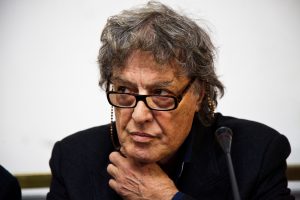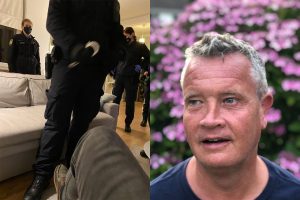10 Oct 2025 | Africa, Americas, Asia and Pacific, Australia, Madagascar, Middle East and North Africa, News, Saudi Arabia, United States
Bombarded with news from all angles every day, important stories can easily pass us by. To help you cut through the noise, every Friday Index publishes a weekly news roundup of some of the key stories covering censorship and free expression. This week, we look at social media restrictions in Afghanistan and the indictment of Letitia James.
Afghanistan
Taliban sources have confirmed that new restrictions on social media platforms in Afghanistan this week are intentional.
Facebook, Instagram and Snapchat are among platforms facing disruption, according to global internet monitor NetBlocks, who also reported another internet outage in Kandahar province.
Last week saw a total telecommunications outage across Afghanistan, which Taliban officials told journalists was caused by old fibre optic cables that needed to be replaced. With this somehow causing a country-wide blackout of both internet and phone services.
USA
New York’s Attorney General Letitia James has been indicted on charges of fraud as part of a wider push by President Donald Trump to use the Justice Department as a weapon against his political enemies.
In 2022 in her position as Attorney General, James had filed a civil lawsuit against the Trump Organisation, as well as aiding in a three-year criminal investigation into Trump’s New York business dealings that led to a now overturned $500 million fraud ruling.
In order to prosecute James and also the former head of the FBI James Comey who had investigated Russian interference in the 2016 elections (and was fired by Trump), the President installed his former personal lawyer Lindsey Halligan as interim US attorney for the eastern district of Virginia. This was after her predecessor refused to bring charges against people Trump had characterised as enemies.
In September before these prosecutions started, Trump posted to Truth Social a message he later admitted was intended as a private memo to Attorney General Pam Bondi stating: “We can’t delay any longer, it’s killing our reputation and credibility. They impeached me twice, and indicted me (5 times!), OVER NOTHING. JUSTICE MUST BE SERVED, NOW!!!”
Comey this week pleaded not guilty to charges of lying to congress.
Australia
Canberra, Australia, 9 October, whistleblower David McBride, who was jailed for leaking documents that alleged Australian Special forces had killed innocent people in Afghanistan, had an application rejected to have his case heard by Australia’s High Court.
This is the latest in an ongoing battle to have his sentencing overturned.
During the original trial, the Australian Government moved to prevent McBride from seeking protection under Australia’s whistleblower laws by blocking expert witnesses from speaking, citing “public interest immunity laws”.
The former military lawyer-turned whistleblower was convicted of three charges last year and sentenced to five years and eight months in prison for the theft of classified documents and for passing the documents to journalists at the Australian Broadcasting Corporation (ABC).
The documents formed the bases of an ABC investigation titled ‘The Afghan Files’ that claimed Australian Special forces units had committed war crimes whilst stationed in Afghanistan.
McBride is the only person imprisoned in relation to these crimes.
Madagascar
Even following the dissolution of his government, embattled President Andry Rajoelina of Madagascar refuses to step down in the face of large scale youth-led protests.
Rajoelina said at a press conference: “I swear that if power cuts persist in the capital within a year, I will resign.”
Protesters from group Gen-Z Mada were not convinced, calling for more protests to take place on Thursday, during which rubber bullets and tear gas were used to disperse demonstrators. They also called for a general strike as a display that they reject the President’s promises.
Saudi Arabia
Human Rights Watch have told comedians who performed at Saudi Arabia’s Riyadh Comedy festival that they “cannot accept” money that originated from the government of Saudi Arabia.
The statement comes as comedians who performed at the festival scramble to get public opinion back on their side.
Bill Burr, Louis C.K. and Omid Djalili have all attempted to spin their participation as positive, whilst comics Aziz Ansari and Jessica Kirson offered to donate their fees in a futile effort to buy back public opinion.
26 Jul 2021 | Africa, Bosnia, Burma, China, Europe and Central Asia, Hong Kong, Hungary, India, Magazine, Magazine Contents, Slapps, Volume 50.02 Summer 2021, Volume 50.02 Summer 2021 Extras
Index’s new issue of the magazine looks at the importance of whistleblowers in upholding our democracies.
Featured are stories such as the case of Reality Winner, written by her sister Brittany. Despite being released from prison, the former intelligence analyst is still unable to speak out after she revealed documents that showed attempted Russian interference in US elections.
Playwright Tom Stoppard speaks to Sarah Sands about his life and new play title ‘Leopoldstatd’ and, 50 years on from the Pentagon Papers, the “original whistleblower” Daniel Ellsberg speaks to Index .
Features
Holding the rich and powerful to account by Martin Bright: We look at key whistleblower cases around the world and why they matter for free speech
The Index: Free expression round the world today: the inspiring voices, the people who have been imprisoned and the trends, legislation and technology which are causing concern
Why journalists need emergency safe havens by Rachael Jolley: Legal experts including Amal Clooney have called for a new type of visa to protect journalists
Spinning bomb by Nerma Jelacic: Disinformation and the assault on truth in Syria learned its lessons from the war in Bosnia
Identically bad by Helen Fortescue: Two generations of photojournalists document the political upheaval shaping Belarus 30 years apart
Always looking over our shoulders by Henry McDonald: Across the sectarian divide in Northern Ireland again, journalists are facing increasing threats
Crossing red lines by Fréderike Geerdink: The power struggle between the PUK and KDP is bad news for press freedom in Kurdistan
Cartoon by Ben Jennings: The reptaphile elite are taking over! So say the conspiracy theorists, anyway
People first but not the media by Issa Sikiti da Silva: There was hope for press freedom when Felix Tshisekedi took power in DR Congo, but that is now dwindling
Controlling the Covid message by Danish Raza and Somak Ghoshal: Covid-19 has crippled the Indian health service, but the government is more concerned with avoiding criticism
Special Report

Reality Winner. Credit: Michael Holahan/The Augusta ChronicleSpeaking for my silenced sister by Brittany Winner: Meet Reality Winner, the whistleblower still unable to speak out despite being released from prison
Feeding the machine by Mark Frary: Alexei Navalny has been on hunger strike in a penal colony outside Moscow, since his sentencing. Index publishes his writings from prison
An ancient virtue by Ian Foxley: A whistleblower explains the ancient Greek idea of parrhesia that is at the core of the whistleblower principle
Truthteller by Kaya Genç: Journalist Faruk Bildirici tells Index how one of Turkey’s most respected newspapers became an ally of Islamists
The price of revealing oil’s dirty secrets: Whistleblower Jonathan Taylor has been hounded since revealing serious cases of bribery within the oil industry
The original whistleblower: 50 years on from the Pentagon Papers, whistleblower Daniel Ellsberg speaks to Index
Fishrot, the global stench of scandal: Former Samherji employee Johannes Stefansson exposed corruption and the plundering of Namibian fish stocks
Comment
What is a woman? by Kathleen Stock and This is hate, not debate by Phoenix Andrews: Two experts debate the case of Maya Forstater, in which Index legally intervened, and if the matter is a case of hate speech
Battle cries by Abbad Yahya: The lost voice of the Israeli-Palestinian conflict
A nightmare you can’t wake up from by Nandar: A feminist activist forced to flee her home country after the military coup in February
Trolled by the president by Michela Wrong: Rwanda’s leader Paul Kagame is known for attacking journalists. What is it like to incur his wrath?
When the boot is on the other foot by Ruth Smeeth: People must fight not only for their own rights, but for the free speech of the people they do not agree with
Culture

Playwright Tom Stoppard. Credit: Liba Taylor/Alamy Stock Photo
Uncancelled by Sarah Sands: An interview with the playwright Sir Tom Stoppard on his new play, Leopoldstadt, and the inspiration behind it
No light at the end of the tunnel by Benjamin Lynch: Yemeni writer Bushra al-Maqtari provides us with an exclusive extract of her award-winning novel, Behind the Sun
Dead poets’ society by Mark Frary: The military in Myanmar is targeting dissenting voices. Poets were among the first to be killed
Politics or passion? by Mark Glanville: Contemporary poet Stanley Moss on his long-standing love for China
Are we becoming Hungary-lite? by Jolyon Rubinstein: Comedian Jolyon Rubinstein on the death of satire
14 Jun 2021 | Croatia, Monaco, News, Uncategorized
[vc_row][vc_column][vc_column_text] An oil industry whistleblower who has been held in Croatia for almost a year on extradition charges has revealed further explosive claims about his former employer.
An oil industry whistleblower who has been held in Croatia for almost a year on extradition charges has revealed further explosive claims about his former employer.
Jonathan Taylor, who in 2013 revealed a bribery and corruption scandal at the Monaco-based Dutch oil company SBM Offshore, claims the company was also involved in a deal which saw tens of millions of dollars promised to a Panamanian company run by a powerful and allegedly corrupt Angolan official.
Taylor released documents to whistleblowing networks and the media which show that British oil company BP had paid $100 million to cancel a shipyard construction project in Angola. A third of the money owed from the cancellation of the deal to build floating oil platforms was earmarked for Sonangol International Inc, run by Baptiste Sumbe. There was no suggestion this agreement was reached with BP’s knowledge or consent.
Taylor’s revelations come as he approaches the anniversary of his arrest on an Interpol red notice while on holiday in Croatia with his wife and three teenage children. Taylor says he is being targeted as retaliation for his whistleblowing.
In 2013, Taylor gave evidence of bribery by SBM Offshore, for whom he worked as a lawyer, to the UK Serious Fraud Office, as well as investigators in the Netherlands and Brazil as well as the FBI.
Taylor’s allegations were at the centre of what became known as the “Petrobras scandal”, where SBM was accused of paying bribes to Brazilian government officials.
As a result of Taylor’s whistleblowing, SBM Offshore was fined over $827 million after being found to have used bribery payments in excess of $275 million.
Taylor now faces extradition to Monaco. On 18 May this year, despite a 10-month long appeal since his detention, the Supreme Court of Croatia issued a judgement confirming the extradition. In response, 40 legal experts, NGOs and campaigners signed an open letter calling for the extradition to be halted. The decision currently rests with Croatian justice minister Ivan Malenica, to whom the letter was addressed.
Taylor is also being targeted with a defamation suit in the Dutch courts, which many consider to be a strategic lawsuit against public participation or SLAPP. The company sought a public apology and damages of €630,000. The claim was not upheld in the Dutch courts, but Taylor faced lengthy and costly court dealings.
He was released on bail on 4 August 2020 and, although Interpol’s red notice has now been withdrawn, Taylor has been forced to remain in Croatia and is facing extradition to Monaco so he can be “interrogated” over alleged offences.
Taylor has been targeted by SBM ever since he blew the whistle on them.
In 2014, his former employers made a complaint to the authorities in Monaco that Taylor had attempted to extort them but could provide no evidence of this and have since withdrawn the complaint.
Taylor’s situation means there has been concern over his mental health. When British diplomats raised these concerns in response to the lawyer’s own fears, he was held in a psychiatric hospital overnight against his will in May earlier this year.
He described the experience, stating that a substance was “forcibly injected” into him.
“Shortly after this I was taken to a room, still cuffed, where I was strapped to a bed by my feet and legs and my hands,” he said. “I then refused unidentified tablets and was invited to swallow them whilst someone held a cup of water to my mouth. I refused. I was then forcibly turned and something was injected into my upper thigh.”
As the anniversary of Taylor’s arrest approaches, whistleblowing charity Protect has called on the UK government to take further action. It has currently only sought only sought assurances that Taylor will be treated fairly if extradited, but has not called on Monaco to withdraw the extradition request.
Andrew Pepper-Parsons, head of policy at Protect, said “These latest disclosures from Jonathan Taylor show just how vital whistleblowers are to revealing corruption. Despite this, Taylor has been held in Croatia for months facing extradition on baseless claims. It is a clear abuse of process which threatens to set back whistleblowing years and sends a terrifying message to whistleblowers across the continent. The UK government needs to take a more robust stance. It must secure Taylor’s safe return home and call on the Monegasque authorities to drop the extradition”.[/vc_column_text][/vc_column][/vc_row][vc_row][vc_column][three_column_post title=”You may also like to read” category_id=”256″][/vc_column][/vc_row]
20 Apr 2021 | Croatia, Monaco, News
[vc_row][vc_column][vc_single_image image=”116596″ img_size=”full” add_caption=”yes”][vc_column_text]A British oil industry whistleblower was detained last night by armed police in Zagreb and held overnight against his will in a psychiatric hospital after British diplomats raised concerns about his mental health.
Jonathan Taylor has been stranded in Croatia since July last year, when he was arrested while entering the country for a holiday with his family. The authorities in Monaco, where he worked for oil company SBM Offshore, have accused him of extortion and requested his extradition to the Principality. He is awaiting a decision from the Croatian Supreme Court this week.
In 2013, Taylor blew the whistle on a multimillion dollar network of bribery payments made by SBM around the world and cooperated with prosecutors in the UK, the US, Brazil and the Netherlands. These investigations resulted in fines against the company to the tune of $827 million and the conviction of two former CEOs of SBM for fraud-related offences. However, Monaco has decided to target the whistleblower rather than those responsible for the bribes.
Freedom of expression organisations, including Index on Censorship, have been lobbying the British government to put pressure on Monaco and Croatia to allow Taylor to return England where his family is now based. Media Freedom Rapid Response partners have demanded an end the extradition proceedings.
Taylor had alerted the British Embassy and the Sofia-based regional consul last Friday about his deteriorating mental health and was asked to put his thoughts into writing. This set off a train of events in Zagreb that Jonathan Taylor relates in his own words here:
“I was met by two armed officers at the roadside to the entrance of the forecourt to my apartment at about 9:15pm last night. I was told I had to wait with them until a psychiatrist arrived in an ambulance. After about 45 minutes we went up to my apartment as it had started raining and the ambulance still hadn’t arrived.
“At about 10:15pm the ambulance drivers arrived and joined the two policemen in my apartment. I was then told I had to accompany them to hospital. I protested stating I had been told a psychiatrist would come to me. I made it clear I was not prepared to leave the apartment. Then four more other armed officers arrived. I again explained I was not happy to go to hospital (see picture top).
“Eventually two of the armed officers manhandled me to the ground causing my head to hit a wall and a resulting headache. I was the cuffed with face against the floor and manhandled out of my apartment into an ambulance where I was strapped into a stretcher. Upon arrival at hospital (no idea where I am) I was dragged out of ambulance and sat on a chair just inside the door to the hospital. I was left there under guard, still handcuffed, for about 30 minutes.
“A lady came to see me (apparently a psychiatrist, but she did not introduce herself) and she asked a few basic questions like ‘why did I arrive with the police?’ and ‘how long had they been following me?’ (!).
“Shortly after this I was taken to a room, still cuffed, where I was strapped to a bed by my feet and legs and my hands. I then refused unidentified tablets and was invited to swallow them whilst someone held a cup of water to my mouth. I refused. I was then forcibly turned and something was injected into my upper thigh. It was now at least 12:30am. At about 6:30am, again against my will, I had a further injection. Another psychiatrist came to see me at about 10:15am and she determined I could go…
“A smiling male nurse has just prodded my arm saying ‘everything will be OK, don’t hate Croatia now!” I have just discovered that I am at the University Hospital Vrapte. What to say?…Where I was looking for help, I got one of the worst twelve-hour experiences of my life.”[/vc_column_text][/vc_column][/vc_row][vc_row][vc_column][three_column_post title=”You may also want to read” category_id=”256″][/vc_column][/vc_row]



 An oil industry whistleblower who has been held in Croatia for almost a year on extradition charges has revealed further explosive claims about his former employer.
An oil industry whistleblower who has been held in Croatia for almost a year on extradition charges has revealed further explosive claims about his former employer.